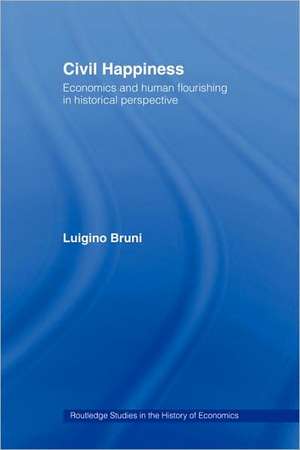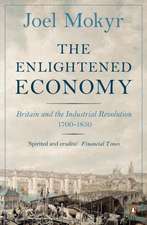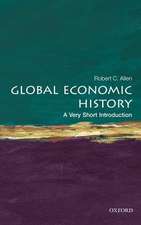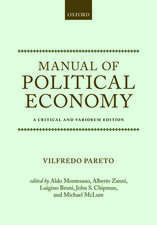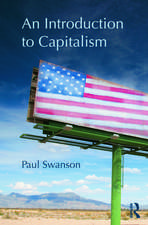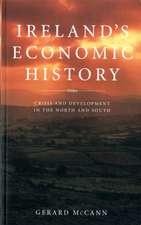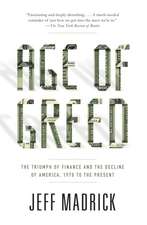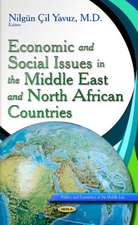Civil Happiness: Economics and Human Flourishing in Historical Perspective: Routledge Studies in the History of Economics
Autor Luigino Brunien Limba Engleză Paperback – 19 feb 2009
Examining the crucial period in the late eighteenth century when economists such Smith and Genovesi tried to reconcile the classical tradition of Civil humanism emerging commercial society, this key book analyses the impact that the hedonist approach to economics had in removing the ethical conception of happiness. In addition, it focuses on the impact that J.S. Mill, Wicksteed and Pareto had in shifting methodological thinking away from an emphasis on civil happiness. Simply put, this book is essential reading for economists everywhere.
| Toate formatele și edițiile | Preț | Express |
|---|---|---|
| Paperback (1) | 411.42 lei 6-8 săpt. | |
| Taylor & Francis – 19 feb 2009 | 411.42 lei 6-8 săpt. | |
| Hardback (1) | 1053.92 lei 6-8 săpt. | |
| Taylor & Francis – 16 mar 2006 | 1053.92 lei 6-8 săpt. |
Din seria Routledge Studies in the History of Economics
-
 Preț: 370.72 lei
Preț: 370.72 lei -
 Preț: 302.54 lei
Preț: 302.54 lei - 8%
 Preț: 385.83 lei
Preț: 385.83 lei -
 Preț: 311.28 lei
Preț: 311.28 lei - 9%
 Preț: 1003.10 lei
Preț: 1003.10 lei -
 Preț: 665.68 lei
Preț: 665.68 lei - 9%
 Preț: 935.39 lei
Preț: 935.39 lei -
 Preț: 384.63 lei
Preț: 384.63 lei -
 Preț: 280.74 lei
Preț: 280.74 lei -
 Preț: 326.99 lei
Preț: 326.99 lei -
 Preț: 311.91 lei
Preț: 311.91 lei -
 Preț: 214.15 lei
Preț: 214.15 lei -
 Preț: 310.43 lei
Preț: 310.43 lei -
 Preț: 326.82 lei
Preț: 326.82 lei -
 Preț: 308.97 lei
Preț: 308.97 lei -
 Preț: 324.46 lei
Preț: 324.46 lei -
 Preț: 388.22 lei
Preț: 388.22 lei -
 Preț: 392.71 lei
Preț: 392.71 lei - 26%
 Preț: 850.91 lei
Preț: 850.91 lei - 27%
 Preț: 995.39 lei
Preț: 995.39 lei - 18%
 Preț: 1005.01 lei
Preț: 1005.01 lei - 18%
 Preț: 1002.60 lei
Preț: 1002.60 lei - 26%
 Preț: 1046.46 lei
Preț: 1046.46 lei - 18%
 Preț: 1280.31 lei
Preț: 1280.31 lei - 18%
 Preț: 1055.51 lei
Preț: 1055.51 lei - 18%
 Preț: 1055.51 lei
Preț: 1055.51 lei - 26%
 Preț: 987.72 lei
Preț: 987.72 lei - 25%
 Preț: 824.17 lei
Preț: 824.17 lei - 18%
 Preț: 1061.93 lei
Preț: 1061.93 lei - 18%
 Preț: 716.32 lei
Preț: 716.32 lei - 18%
 Preț: 1006.07 lei
Preț: 1006.07 lei - 18%
 Preț: 1069.92 lei
Preț: 1069.92 lei - 12%
 Preț: 342.67 lei
Preț: 342.67 lei - 26%
 Preț: 991.34 lei
Preț: 991.34 lei - 18%
 Preț: 1056.00 lei
Preț: 1056.00 lei - 18%
 Preț: 1076.53 lei
Preț: 1076.53 lei - 18%
 Preț: 698.08 lei
Preț: 698.08 lei - 22%
 Preț: 332.02 lei
Preț: 332.02 lei - 18%
 Preț: 1169.78 lei
Preț: 1169.78 lei - 18%
 Preț: 1059.84 lei
Preț: 1059.84 lei - 30%
 Preț: 852.88 lei
Preț: 852.88 lei - 25%
 Preț: 830.10 lei
Preț: 830.10 lei - 18%
 Preț: 1125.78 lei
Preț: 1125.78 lei - 18%
 Preț: 1062.98 lei
Preț: 1062.98 lei - 18%
 Preț: 847.96 lei
Preț: 847.96 lei - 18%
 Preț: 953.01 lei
Preț: 953.01 lei - 18%
 Preț: 1168.76 lei
Preț: 1168.76 lei
Preț: 411.42 lei
Nou
Puncte Express: 617
Preț estimativ în valută:
78.73€ • 82.40$ • 65.52£
78.73€ • 82.40$ • 65.52£
Carte tipărită la comandă
Livrare economică 31 martie-14 aprilie
Preluare comenzi: 021 569.72.76
Specificații
ISBN-13: 9780415494106
ISBN-10: 0415494109
Pagini: 186
Dimensiuni: 156 x 234 x 10 mm
Greutate: 0.34 kg
Ediția:1
Editura: Taylor & Francis
Colecția Routledge
Seria Routledge Studies in the History of Economics
Locul publicării:Oxford, United Kingdom
ISBN-10: 0415494109
Pagini: 186
Dimensiuni: 156 x 234 x 10 mm
Greutate: 0.34 kg
Ediția:1
Editura: Taylor & Francis
Colecția Routledge
Seria Routledge Studies in the History of Economics
Locul publicării:Oxford, United Kingdom
Public țintă
Postgraduate and ProfessionalCuprins
Introduction and Summary. Acknowledgements. Part 1: Happiness, Again 1. The Easterlin Paradox 2. Happiness and More 3. What is Happiness? Part 2: The Explanations of the Easterlin Paradox 1. Hedonic Treadmill and Set-Point Theory 2. Satisfaction Treadmill 3. The ‘social treadmill’ Part 3: From the ‘Civil’ to the ‘Uncivil’ Animal 1. Aristotle’s Eudaimonia 2. Civic Humanism 3. The Sunset of the Civil 4. The ‘Uncivil Animal’ Tradition Part 4: Public Happiness 1. Towards a New Foundation of Civil life 2. Della Pubblica Felicità 3. Between Tradition and Modernity Part 5: Genovesi, and the Neapolitan School of Civil Economy 1. The Bright Lights of Naples 2. Civil Virtues, Public Happiness 3. On the Other Hand: Private Interests and Common Good in Civil Economy Tradition 4. Economia Civile and Fede Pubblica Part 6: Happiness as Reciprocity 1. A Relational Anthropology 2. More than Sociality: Reciprocity 3. Wealth and Happiness 4. The Happiness of Others 5. A Short Evaluation Part 7: Adam Smith: Sociality Outside Market 1. Market and Civil Society 2. Trust as Reputation 3. Happiness as Deception 4. Which Sociality in Market? Part 8: The Cambridge Civil Tradition 1. Malthus on Happiness and Sociality 2. Marshall, the ‘Good Economic Science’ 3. Analogies and Differences Part 9: Happiness Becomes Pleasure 1. The English Happiness 2. John Stuart Mill 3. Bentham’s Hedonic Happiness 4. The (Anti)Classical Hedonist Economics Part 10: 1. Pareto and Wicksteed: The Definitive Divorce Between Economics and Civil Happiness 2. Wicksteed’s Non-Tuism Part 11: Happiness and Relational Good. References
Descriere
This impressive volume presents an historical review of the evolution of economic thought. Bruni offers a significant contribution for a new season of studies on happiness and sociality in economics.
